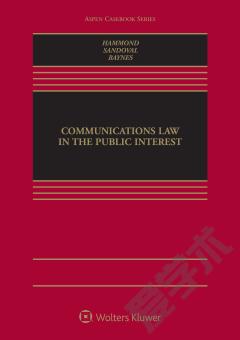Communications Law in the Public Interest
Looking through a historical lens, this new casebook examines the evolution of telecommunication law, policy, and technology from the telegraph to the Internet. It examines six key industries: broadcast, cable TV, telephone, satellite, wireless, and the Internet. The book’s novel format begins with introductory chapters analyzing the nature of spectrum and regulation of spectrum-based services and the history and technology that link the regulation of telegraph-to-telephone-to-the-Internet. This casebook analyzes conceptions of the public interest as defined by statute, case law, and FCC and state decision-making. It contrasts the legal and economic standards used by antitrust law as compared to communications law. It examines telecommunication regulation through the lens of five key concepts: functionality, ownership or licensing, access, speech, and the public interest. The casebook offers projects and hypotheticals that support analysis of issues from the perspective of constitutional, administrative and communications law, as well as statutory issues raised by communications and information technology regulation. Professors and students will benefit from: A mix of theoretical and practical readings that build understanding of telecommunications technology, law, and regulation. A format friendly to both in-person and online teaching and study. Offering a combination of text, PowerPoint slides, links to video materials, and commentary that can be shared with students or used by the professor, the casebook includes projects students can generate and share through a live or online class. Historical perspective of federal and state communications policy beginning with the creation of the telegraph system, through the evolution and growth of the telephone system, the growth of broadcasting, cable, and satellite, and the growth of the Internet and Internet of Things. Knowledge and skills to recognize and litigate statutory, constitutional, Administrative Procedures Act, and other legal issues. Legislative and regulatory drafting, analysis, and decision-making skills, consistent with legal standards. Case and regulatory analysis, questions and projects that support writing, experiential, or exam-based courses and the production of student papers and presentations. Student skill-building to file comments in FCC and state communications regulatory decision-making dockets, and to file amicus briefs for legal cases.
{{comment.content}}








 京公网安备 11010802027623号
京公网安备 11010802027623号